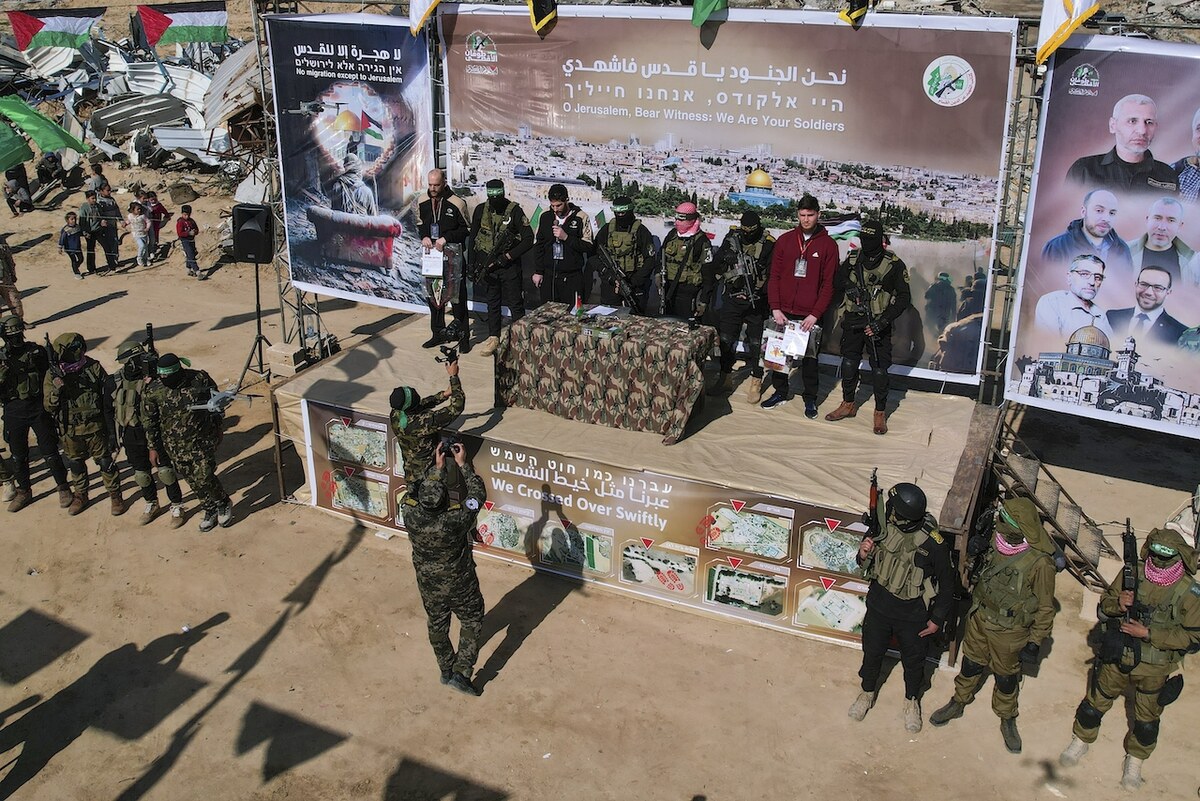PARIS: World leaders have welcomed a ceasefire deal between Israel and Lebanese militant group Hezbollah, which came into force on Wednesday morning (0200 GMT).
The ceasefire between Israel and Lebanon will protect Israel from the threat of Iran-backed militant group Hezbollah and create the conditions for a “lasting calm,” US President Joe Biden and French President Emmanuel Macron said ahead of the truce coming into force.
“The announcement today will cease the fighting in Lebanon, and secure Israel from the threat of Hezbollah and other terrorist organizations operating from Lebanon,” the leaders said in a joint statement.
The United States and France will work “to ensure this arrangement is fully implemented” and lead international efforts for “capacity-building” of the Lebanese army, they added.
Biden welcomed the deal as “good news” and also said the US would lead a fresh effort to secure a truce between Israel and Palestinian militant group Hamas in Gaza.
Macron said the Lebanon ceasefire should “open the path” for an ending to the war in Gaza.
Israeli Prime Minister Benjamin Netanyahu thanked the US president for his “involvement in securing the ceasefire agreement.”
He told Biden in a call that he appreciated the US leader’s “understanding that Israel will maintain its freedom of action in enforcing it,” according to Netanyahu’s office.
Ahead of Israel’s approval of the deal, Netanyahu said the “length of the ceasefire depends on what happens in Lebanon” and the truce would allow Israel to “intensify” pressure on Hamas and focus on the “Iranian threat.”
Lebanese Prime Minister Najib Mikati said the ceasefire was a “fundamental step” toward restoring stability in the region.
Thanking France and the US for their involvement, Mikati also reiterated his government’s commitment to “strengthen the army’s presence in the south.”
Iran, a backer of both Hezbollah and Hamas, welcomed the end of Israel’s “aggression” in Lebanon, after the ceasefire came into force.
“Welcoming the news” of the end of Israel’s “aggression against Lebanon,” foreign ministry spokesman Esmaeil Baghaei said, stressing Iran’s “firm support for the Lebanese government, nation and resistance.”
Hamas official Sami Abu Zuhri said the group “appreciates” Lebanon’s right to reach an agreement that protects its people, and it hopes for a deal to end the war in Gaza.
“Hamas appreciates the right of Lebanon and Hezbollah to reach an agreement that protects the people of Lebanon and we hope that this agreement will pave the way to reaching an agreement that ends the war of genocide against our people in Gaza,” Abu Zuhri told Reuters.
China said it was “paying close attention to the current situation in Lebanon and Israel.”
“We support all efforts conducive to easing tensions and achieving peace and welcome the agreement reached by relevant parties on a ceasefire,” foreign ministry spokeswoman Mao Ning said.
German Foreign Minister Annalena Baerbock welcomed the deal, hailing it as “a ray of hope for the entire region.”
“People on both sides of the border want to live in genuine and lasting security,” Baerbock said, calling the deal “a success for diplomacy.”
British Prime Minister Keir Starmer praised a “long overdue” ceasefire that would “provide some measure of relief to the civilian populations” of both Israel and Lebanon.
Calling for the truce to be “turned into a lasting political solution in Lebanon,” Starmer vowed to be at the “forefront of efforts to break the ongoing cycle of violence in pursuit of a long-term, sustainable peace in the Middle East.”
EU chief Ursula von der Leyen hailed the “very encouraging news” of the ceasefire, saying it would increase Lebanon’s “internal security and stability.”
The announcement was welcome news “first and foremost for the Lebanese and Israeli people affected by the fighting,” Von der Leyen said.
“Lebanon will have an opportunity to increase internal security and stability thanks to Hezbollah’s reduced influence,” she said.
A top UN official welcomed the ceasefire agreement, but warned that “considerable work lies ahead” to implement the deal.
“Nothing less than the full and unwavering commitment of both parties is required,” said UN special coordinator for Lebanon, Jeanine Hennis-Plasschaert.
Jordan said the ceasefire deal between Israel and Hezbollah should prompt greater international efforts to bring an end to the war in Gaza.
In an official statement, the kingdom said the move was also a first step towards reversing a dangerous escalation of tensions across the region that had threatened peace and security.
Iraq welcomed the ceasefire between Israel and Hezbollah in Lebanon, calling on the international community to act urgently to end Israel’s war with Hamas in Gaza.
A foreign ministry statement called for “multiplying international efforts to avoid any new escalation” along the Israel-Lebanon border, while also urging “serious, urgent steps to stop the continued massacres and violations against the Palestinian people in the Gaza Strip.”
Turkey said that it was ready to give Lebanon the “necessary support for the establishment of internal peace” hours after a ceasefire with Israel came into force.
The Palestinian Authority welcomed the 60-day ceasefire in Lebanon and expressed hope it would bring stability to the region.
“We hope that this step will contribute to stopping the violence and instability that the region is suffering from,” the Palestinian presidency said in a statement, and highlighted the need to enforce a UN resolution for a ceasefire in the Gaza Strip.
Russia gave a belated welcome to Wednesday’s ceasefire between Israel and Lebanese militant group Hezbollah, saying it hoped the agreement would be “actually effective.”
“We look favorably on any agreement, potential or concluded, that would stop the spiral of violence, stop the bloodshed in Lebanon... but they have to be actually effective,” foreign ministry spokeswoman Maria Zakharova said Wednesday in a briefing.




























